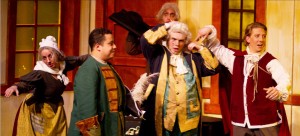Operas are tricky. When a performance relies solely on the raw talent of the actors, one wrong note can be the difference between a standing ovation and the sound of crickets chirping in the aisle. Add college students into the mix, and the chances of a show ending up as a train wreck become even more likely.
For every train wreck, though, there’s a success story, and luckily for the College, TCNJ Lyric Theatre’s production of “The Barber of Seville” fits into the latter category. Performing four shows between March 24 and 27 in the Don Evans Black Box Theatre, the small cast put on a show worth well more than the $5 admission fee.
Set in the early 1800s, “The Barber of Seville” is a comedic opera focusing on Count Almaviva’s (junior vocal performance major Jared Salwen) attempts to woo his love, Rosina (junior music education major Nicole Cascione), away from her dastardly guardian, Dr. Bartolo (senior music performance major Ian Highcock).
With the help of Figaro (2010 alumnus Daniel Cameron), the town barber and a jack-of-all-trades, Almaviva takes part in a hilarious scheme that involves mistaken identity, mass confusion, and, of course, a happy ending.
Oh, and singing. Lots and lots of singing.
It was here that everything could have fallen apart. There’s nothing worse than listening to two and half hours worth of tone-deaf performers stumbling through a show, hitting the correct notes here and there by nothing other than the grace of God.
Thankfully, every member of the “Seville” cast could not only carry a tune, but did so with so much skill that one could forget that it was a college production. Cascione in particular hit note after note without any noticeable effort, showing off her gorgeous soprano range.
Of course, even the best vocals can’t carry a performance if the actors have nothing else to offer. Once again, the “Seville” cast avoided this trap with their on-point comedic timing and commitment to their characters.
Salwen brought impressive versatility to the stage, managing to create not one but three different characters: Count Almaviva, a drunken soldier and a high-pitched music teacher, switching between the three at the drop of a hat. Highcock’s Bartolo was the perfect combination of bumbling and lecherous, and Cameron exuded confidence and charm as the self-proclaimed genius Figaro.
The show stealer, however, was senior music education major Nicholas Dogas as Basilio, a friend of Bartolo’s who is more than willing to slander a man for a coin or two.

Whether he was plotting with Bartolo or leering maniacally at the crowd, Dogas brought laughs with nearly every movement he made.
What made the production truly great, however, was the attention to detail. Little gags were constantly thrown in throughout the show
for the enjoyment of audience members attentive enough to notice them. A shaving scene between Cameron and Highcock or the exaggerated piano playing of Salwen were easy to miss against the action of their respective scenes but were hysterical in their own right.
Cameron in particular hammed his way through several scenes, stealing the spotlight even when he was in the background with his hilarious facial expressions.
The sets and costumes for the show were well done but almost unnecessary. “Seville” was carried by its performers, and the cast could have stood on an empty stage and still put on a convincing performance.






